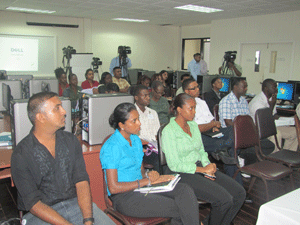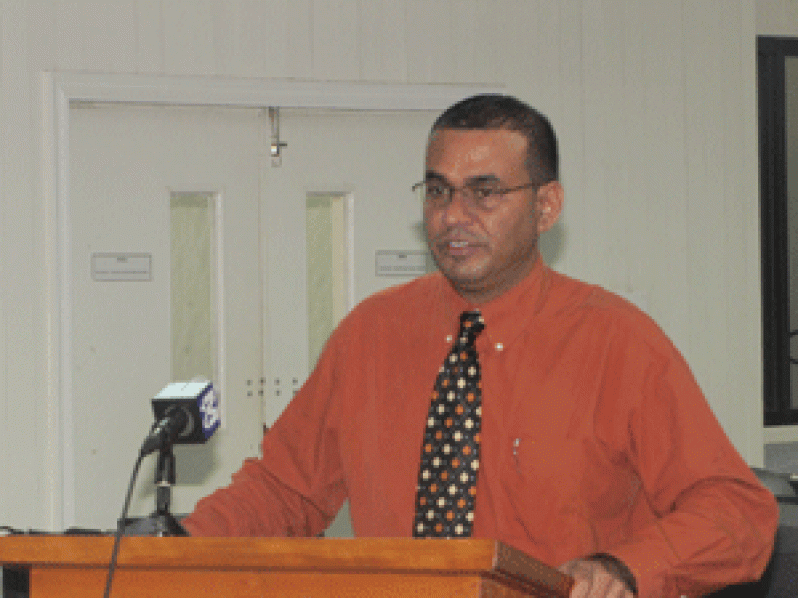Biosafety importance underscored at EPA workshop
THE Environmental Protection Agency (EPA) engaged students of the University of Guyana (UG), yesterday, in its second national training workshop to continue enhancement of capacity building for effective participation in phase two of the Biosafety Clearing House (BDC).  Delivering the feature address at the opening, on the UG Turkeyen Campus, Minister of Natural Resource and the Environment, Mr. Robert Persaud said Guyana is making effort to ensure that the country’s capability and capacity is constantly being improved with regards to biosafety.
Delivering the feature address at the opening, on the UG Turkeyen Campus, Minister of Natural Resource and the Environment, Mr. Robert Persaud said Guyana is making effort to ensure that the country’s capability and capacity is constantly being improved with regards to biosafety.
He said: “Guyana, over the years, has taken a bold step and has passed through successive governments, even prior to the PPP/Civic Government whereby we’ve demonstrated firm and strong commitments, in terms of sustainable development.”
Persaud added that the management and utilisation of the country’s resources and, simultaneously, safeguarding its environment is of paramount importance.
He said this has been a constant feature of successive governments, which is something of which all Guyanese should be proud and, in recent times, Government has reinforced the national commitment with the Low Carbon Development Strategy (LCDS).
Persaud noted that Guyana has signed on to a number of international conventions, going back to the Convention on Biodiversity and the range of United Nations (UN) obligations and even others that Guyana has satisfied.
He said: “Our Low Carbon Development Strategy, in a way, firmly commits us at the national level, in terms of taking steps that will not only see us complying with these international obligations but, at the same time, allowing us to continue development and not jeopardising our environment and the future well-being.
CHANGES
“We live in a world, too, where there are a lot of changes, where technology is being employed in all aspects of life.”
Persaud said, with that in mind, efforts have been made in promoting and bringing biotechnology within the realm of food production for Guyana to the cutting edge.
That should be done in a manner that it will not lead to problems, for instance, that genetic modified organisms (GMOs) are not imported, hence threatening the country’s biodiversity, he posited.
Persaud said, while, as a country, Guyana has not yet defined its policies of GMOs and is still in the process of studying, reviewing and constantly assessing the best case, some countries have gone to full GMOs and taken a hybrid approach.
“We don’t want to be dinosaurs in this field but, at the same time, we want to take a cautious approach,” he stated.
Persaud said the training that the students are undergoing will allow Guyana to not only be enlightened on biosafety clearing house requirements but also build capacity to continue a cautious outlook.
According to him, Guyana has employed and deployed biotechnology in various areas of agriculture, which features in laboratories that have been constructed for both plant and animal health,
He said members of the Private Sector, particularly in the beverage industry, also employ biotechnology. However, the focus is to ensure that its utilisation does not compromise Guyana‘s biodiversity.
“We’re also a country in transition and, whilst we’re expanding the traditional sectors of the economy, we’re also looking at new areas of development,” Persaud explained.
He said the new areas of utilisation and activities would lend to the utilising of biotechnology and require enhanced biosafety arrangements at the national level.
RISKS
Persaud said, in the areas of mining and the petroleum industry with the risks associated, the utilisation of biotechnology becomes necessary in light of expansion.
He said the Plant Health Act that was passed late in the Ninth Parliament, incorporated features of enhanced biosafety and enhances them, too.
In terms of updating and modernising legislation, Government has taken a decision to build biosafety aspects into it. In addition, the Seeds Act that was also legislated provides for the development of a robust system in managing the transfer of biotechnology.
“Whilst we may not have specific biosafety legislation, the different realm of activities exposed to the utilisation of biotechnology has been updated,” he noted.
Guyana is one of twelve signatory countries, at the regional level, whereby a significant amount of work has been done, in terms of a Caribbean biosafety project, Persaud disclosed.
He said: “As we continue to develop our country, the opportunities are out there but also with the associated risks and the utilisation of biotechnology would become very crucial. So it is important that Guyana prepares to be compliant at the international level.”
Persaud said the universal arrangement of biosafety came out of the Rio Summit in 1992 and it is very important, as countries are preparing for another such meeting, to report that tremendous progress has been made.
Meanwhile, facilitator of the workshop and specialist in implementation of the Multilateral Environmental Agreement, Mr. Fred Phillips said the seminar is aimed at re-acquainting persons with the BCH and the online information that is available to give access to the state of biosafety on the international level.
The programme started yesterday is continuing.




.jpg)










